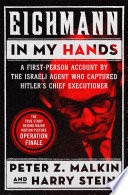After I saw the unsatisfying Operation Finale, I knew that I was going to read Peter Z Malkin’s Eichmann in My Hands: A compelling first-person account by the Israeli agent who captured Hitler’s chief executioner. Malkin’s book did not disappoint. I actually can understand what the movie was trying but ultimately failed to convey, which made me appreciate the filmmakers’ efforts more. The movie is a waste of your time. Read this compelling book instead.
Eichmann in My Hands uses one narrative trope that I usually hate, but worked spectacularly: the how we got here narrative framing device. It starts at the end, but as the reader, that is how we are familiar with Eichmann: sitting in the dock during his trial. So in this case, it is a perfect way to relate to the narrator regardless of our differences in experience, temperament and characteristics because the narrator and the reader occupy the same space: observing Eichmann at his nadir. Then the book uses intersecting storylines to parallel and show what Eichmann and Malkin were doing at the same time to compare and contrast the men so that when they meet, the tension is already heightened further. Then Malkin’s activities as an agent leading up to this moment feel straight out of a spy thriller, but way more interesting to me because it is as close to reality as ordinary readers will get to the real deal. Then the capture, transport and effect of the successful mission on Malkin and others provide a satisfying ending to a story that you never want to end.
Eichmann in My Hands is an absorbing and quick read. His ability to effectively convey personalities, introspection and logistics without stumbling should not be taken for granted. If someone is not boring when describing the logistics of a plan, it does not necessarily mean that the same person will have the psychological depth to reflect, understand then convey the inner life of himself or his fellow agents. His artistic proclivities and his fervor for adventure probably helped, and also make the book an interesting travelogue since he is genuinely interested in the countries that he visits. In addition, as someone who was only concerned with living in the present and did not devote a lot of thought to his past until he received the Eichmann assignment, Malkin can relate to a reader who only theoretically has a dog in the fight and gets us invested by showing how he gradually permits himself a chance to look back and comprehend the depth of what Eichmann did to him and his family personally.
Operation Finale should have just adapted the book as is instead of using cheesy Hollywood tropes to make it more dramatic. The movie failed because it failed to successfully and fully adapt any agent’s story, including Malkin, which it devotes most of its efforts to. The Smurfette in the movie is more of a composite character, wishful thinking so thank God that no woman agent was an ineffective as she was though there was a woman agent with different duties and no romantic ties to Malkin. Malkin shows his problematic side in his discussion about women agents. He expects a level of perfection and more intangible, psychological labor from them than he does not from their male counterparts who are all severely flawed and made crucial mistakes that do not completely obliterate what skills and talents they do bring to the table. Then on top of that, he purposely wants them homely. Can you imagine if you worked with him then read his book if you were a woman agent? I’m what!?!
While the Mossad agents were concerned about getting caught by Argentine authorities and causing an international incident, the reality seemed to be official cluelessness. While Eichmann’s son boasted that he could do something, it sounded more like empty talk with no facts to back it up so Operation Finale’s Nazi search party and maid screwing up was complete fiction. To be fair, Eichmann in My Hands was not written from that side’s perspective, but it did not feel right as I watched it, and it still rings hollow after reading the book.
Fun fact: Malkin was not on the plane that took Eichmann, but was left behind and had a difficult time finding a way to get back home because of a special event. While I agree that reality is not such a tidy ending and would have felt meandering if it was depicted on screen, I thought that the real ending, how everyone’s trauma begins to abate once the boogey man is captured, and people generally could start living their lives as if a curse was broken was a beautiful one that the movie could use. The book has a memorable exchange between Malkin and a NY cab driver that still resonates.
Eichmann in My Hands makes me wonder on a quotidian level how many people are going through elaborate exercises around us to avoid detection, suspicious of everyone and everything while we’re oblivious and just living life. What exactly is the right level of paranoia for normal people and agents? Malkin is dead so unfortunately we won’t get more read deal insights from an effective globetrotting spy.
I highly recommend that you read Eichmann in My Hands. It won’t take long, and you won’t regret it. If you’re remotely interested in World War II, secret agents or justice, you should check it out.

Eichmann in My Hands
Stay In The Know
Join my mailing list to get updates about recent reviews, upcoming speaking engagements, and film news.




